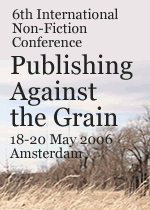'How can we make the market work for what we consider to be important critical non-fiction?'
In the report of the latest Non-fiction Conference (May 2006 in Amsterdam) you will find statements like: ‘American people should know what’s happening to the lives of people that were so influenced by decisions of a government that they supported’; ‘the book business now is doing entertainment and not culture’; ‘it is sad that in a country that claims to have formed the rights of man, freedom of expression is under threat from those who are responsible for upholding justice and that we are forced to depend on European institutions’;
Or:
‘the important thing is that it’s out, once it’s printed the book is there, even if we are forbidden to sell it, it will still be there’; ‘my experience is that it was always good to come from Holland and not from America’; ‘it’s not a matter of writer capacity, it’s more a matter of initiative, of method, and of courage amongst the publishers, in order to challenge power and to challenge truth’; ‘we should be forging ahead of the market and saying what can we provide that nobody in the grand public knows about’; ‘Editors of the world, stand by your authors who contradict and who expose falsity’; ‘it’s to get the facts right, not just for the human story, it’s really the two together that become so powerful and so meaningful’; ‘people just won’t publish people with Iranian names, Iraqi names. They prefer to get someone who has an English name, who’s never spoken Farsi or Arabic in his life and writes about that country. That they feel safe with’; ‘so much of critical publishing when it’s on politics takes a completely predictable line’; ‘when I look at the unsung heroes of publishing, in the field that I really enjoy working in, they are the translators’; ‘Americans are incomplete without literary translation and other such expressions of cultural openness, without which we lose our own best qualities’; ‘I would suggest that we will join forces after this conference in continuing to publish against the grain and one day we may all be fleas owning a dog instead of the other way around.’
We invite you to read on. Your responses are welcome.
Published: January 5, 2007 features | non-fiction

